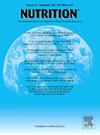Effects of Nichi BRITE β-glucans as an onco-nutrition adjuvant in patients undergoing subtotal stomach-preserving pancreaticoduodenectomy (SSPPD) for pancreatic, bile duct and duodenal malignancies: A clinical study
IF 3.2
3区 医学
Q2 NUTRITION & DIETETICS
引用次数: 0
Abstract
Objectives
Pancreatic cancers involve several challenges from difficulty in early diagnosis to high recurrence and mortality even after therapeutic interventions. Patients who undergo a surgical resection have several postoperative complications besides recurrence. Immunosuppression in the peri-operative period is a major challenge to overcome and in this study we investigated the effects of AFO-202 strain Aureobasidium-pullulans produced β-glucan (Nichi BRITE) in patients who underwent subtotal stomach-preserving pancreaticoduodenectomy (SSPPD) for pancreatic, bile duct and duodenal malignancies.
Methods
Thirty patients undergoing SSPPD were randomly assigned to a control (n = 15) group. A placebo was given, and the treatment arm (n = 15), administered Nichi BRITE 250 mg (Glucan) in 3 divided doses per day, starting from 1 d prior to the day of surgery up to the 21st postoperative day, either by oral intake or feeding gastrostomy. Parameters of relevance to immune system and biomarkers of cancer pathology were evaluated.
Results
Among the 22 patients who completed the study, the Nichi BRITE group showed notable increases in BG-IgA (+109.09%), CD209 (+54.68%, P = 0.034), and SAA (+800.70%, P = 0.050), while CA 19-9 decreased significantly (−5.86 U/mL, P < 0.001). Decrease in CD44 levels was greater in Nichi BRITE (−35.51%) than in the Placebo group (−14.05%). Disease-free survival (DFS) was longer in the Nichi BRITE group (16.1 mo) compared to the Placebo group (12.4 mo), with a lower recurrence rate (50% versus 71.4%) for pancreatic cancers.
Conclusions
Administration of Nichi BRITE β-glucan during the perioperative period in patients undergoing surgery for pancreatic, bile duct and duodenal malignancies has been safe, and it has yielded immune enhancement and improvement in biomarkers of better prognosis. Reduction in circulating cancer stem cells and pancreatic cancer marker CA19-9 inclines us to recommend this Nichi BRITE β-glucan be included in onco-nutrition guidelines for patients undergoing surgical removal of malignant tumors.
一项临床研究:Nichi BRITE β-葡聚糖作为一种肿瘤营养佐剂在行次全保胃胰十二指肠切除术(SSPPD)治疗胰腺、胆管和十二指肠恶性肿瘤的患者中的作用
目的胰腺癌包括早期诊断困难、高复发率和高死亡率等诸多挑战。接受手术切除的患者除复发外还有其他并发症。围手术期的免疫抑制是一个需要克服的主要挑战,在本研究中,我们研究了AFO-202菌株产生的β-葡聚糖(Nichi BRITE)在接受次全胃保胃胰十二指肠切除术(SSPPD)治疗胰腺、胆管和十二指肠恶性肿瘤患者中的作用。方法30例SSPPD患者随机分为对照组(n = 15)。给予安慰剂,治疗组(n = 15)给予Nichi BRITE 250 mg(葡聚糖),每天3次,从手术前1天开始,直到术后第21天,通过口服摄入或喂养胃造口。评估与免疫系统相关的参数和癌症病理的生物标志物。结果在完成研究的22例患者中,Nichi BRITE组的BG-IgA(+109.09%)、CD209 (+54.68%, P = 0.034)、SAA (+800.70%, P = 0.050)显著升高,CA 19-9显著降低(- 5.86 U/mL, P <;0.001)。Nichi BRITE组CD44水平的下降幅度(- 35.51%)大于安慰剂组(- 14.05%)。与安慰剂组(12.4个月)相比,Nichi BRITE组的无病生存期(DFS)更长(16.1个月),胰腺癌的复发率更低(50%对71.4%)。结论在胰腺、胆管和十二指肠恶性肿瘤手术患者围手术期给予Nichi BRITE β-葡聚糖是安全的,并能增强免疫和改善生物标志物,预后较好。循环肿瘤干细胞和胰腺癌标志物CA19-9的减少,使我们倾向于推荐将这种Nichi BRITE β-葡聚糖纳入恶性肿瘤手术切除患者的肿瘤营养指南。
本文章由计算机程序翻译,如有差异,请以英文原文为准。
求助全文
约1分钟内获得全文
求助全文
来源期刊

Nutrition
医学-营养学
CiteScore
7.80
自引率
2.30%
发文量
300
审稿时长
60 days
期刊介绍:
Nutrition has an open access mirror journal Nutrition: X, sharing the same aims and scope, editorial team, submission system and rigorous peer review.
Founded by Michael M. Meguid in the early 1980''s, Nutrition presents advances in nutrition research and science, informs its readers on new and advancing technologies and data in clinical nutrition practice, encourages the application of outcomes research and meta-analyses to problems in patient-related nutrition; and seeks to help clarify and set the research, policy and practice agenda for nutrition science to enhance human well-being in the years ahead.
 求助内容:
求助内容: 应助结果提醒方式:
应助结果提醒方式:


